#saves the world in hellblazer at least a handful of times because “who else is gonna do it” even though he isn't directly affected at times
Explore tagged Tumblr posts
Text
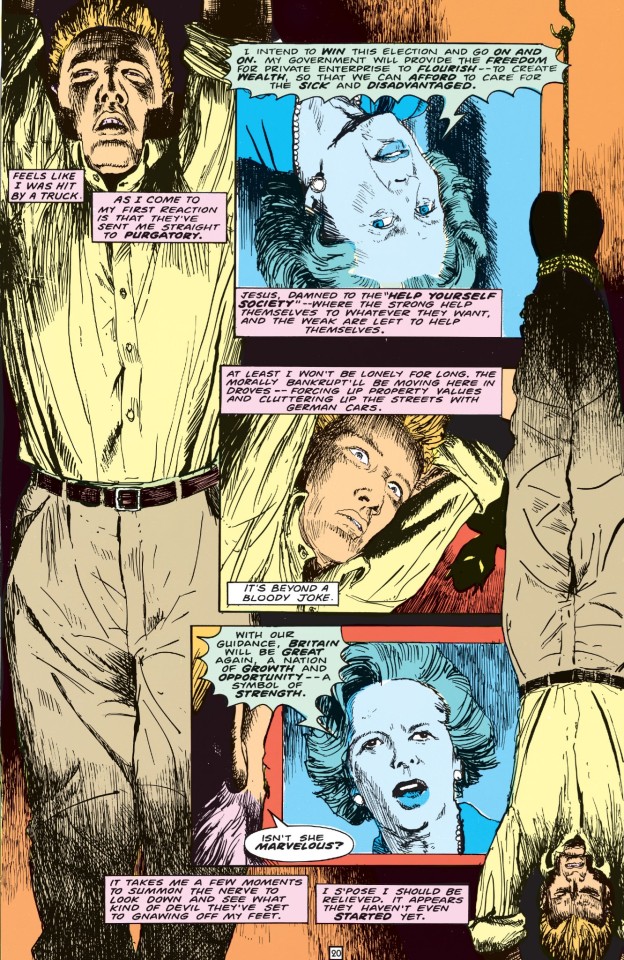
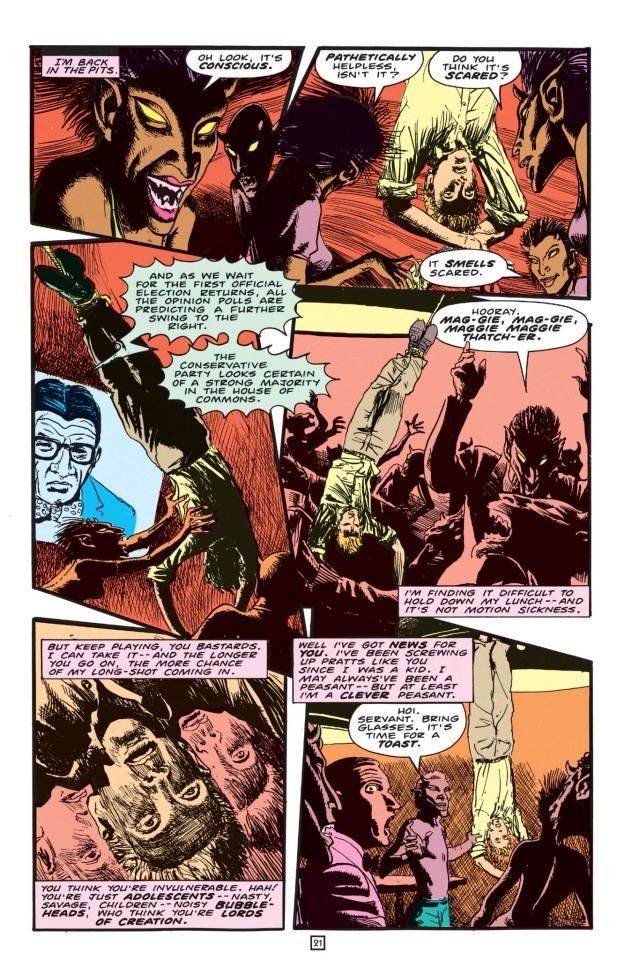
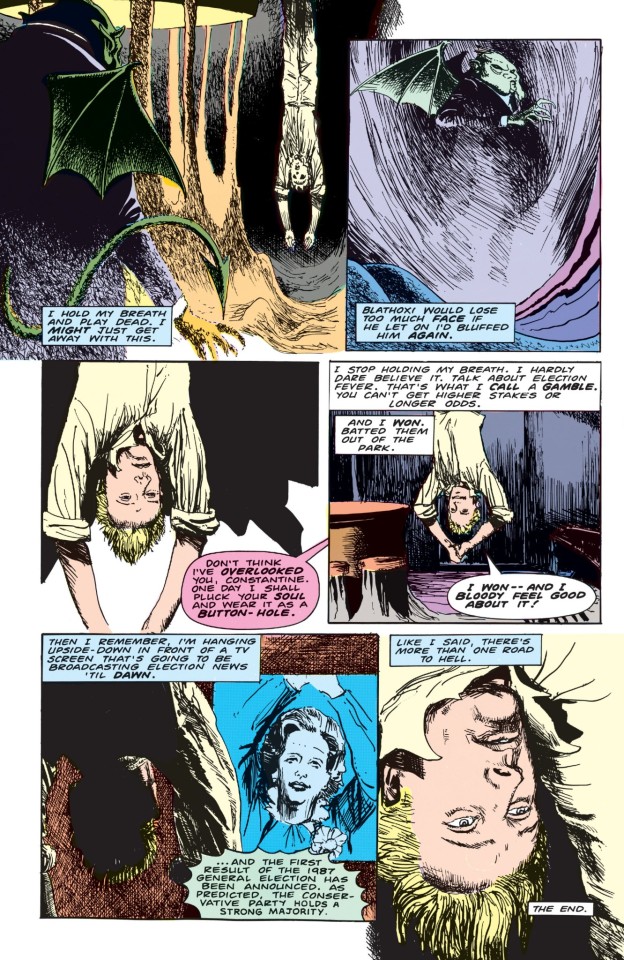
ah, here he is. three issues into hellblazer. john is very clearly someone that doesn't hold the popular political opinion, and with the values she held, it's clear why.
i live in. america. so i had to do some separate research on my own during my first read through and feel free to correct me if i'm wrong, but she held a policy where basically the government would step back and let businesses collapse if they couldn't make enough money without government support. she didn't want trade unions. she wanted to base the economy on banking and service instead of manufacturing, so people in london ended up successful and pretty much anywhere else in the united kingdom wasn't doing so hot because employment was falling flat. then she pulled government support from the failing industries and people lost their jobs and so many people fell into poverty.
so yeah, after reading all of this, it made it a lot easier to understand why the demons of hell would support her and john would feel tortured listening to her acceptance speech. as you learn more about him through reading hellblazer- and, hell, even in this issue- he's against this sort of thing. gave a quid to a lady to feed her baby, and he's got a friend who's gay and eventually reveals that he has aids. of course, there's more, but i like to have scans as proof and i don't have too many at the moment.
john is for the rights of everyone. he wants everyone to have equal opportunity. the shit thatcher pulls doesn't really provide that, if london is the financial center and places like ireland, northern and western england, and so on are no longer getting support and communities are falling into poverty. it's like fucking people over because you don't think they deserve a chance and getting rid of industries because they're failing and pulling support from them is treating the government like a business rather than something that's meant to have your back when you fall. something that's supposed to lead and protect. you let someone fall into poverty, who are you protecting? the upper class, especially if you aren't doing anything to help get the people in poverty out of it. some might argue it's not the government's job to make sure you have the necessities to survive like food, water, shelter, and in our society a job, but. it is.
i could be missing some things on thatcher, so feel free to correct me or add to this, but yeah. that's the post.
#john constantine#hellblazer#british politics of the 1980s....#just. seeing moments like these really show you what kind of guy john really is#i think john is the kind of guy that really does care about other people but he doesn't know how to show it all the time#which translates into people thinking he's selfish and doesn't care about anyone#we see this. a lot. even in the new dc stuff#“we can't trust you” “you only care about yourself” even if he ends up putting his life on the line for everyone multiple times#saves the world in hellblazer at least a handful of times because “who else is gonna do it” even though he isn't directly affected at times#sigh. yeah#basically#i like learning more to understand his point of view on things
23 notes
·
View notes
Note
As someone whos read most of Hellblazer only once, John is a very edgy and tonally different character from Zee who definitely does not drink his respect women juice, Wondering if JohnZee fans have read his original series at all and know this? D:
They are very tonally different. I remember encountering a Hellblazer fan on CBR who disliked Everyday Magic and it's depiction of Constantine. The tonal difference is probably the reason why Zatanna was reinterpreted as a more moody and serious character when JLD debuted. (Note that Zatanna can work in light or dark stories but these days the trend seems to be to make her darker, moodier and more serious as a character. There should be a balance imo. )
Most JohnZee fans I encounter are fans of JLD (both animated and comics) and the Bombshell universe. The response from Hellblazer fans, at least from my experience has been mixed, some like the JohnZee pairing, others I've spoken to online prefer him with Kit Ryan and loathes him hanging out with superheroes and doing superhero shit.
There was a poll on Reddit in 2021 where the users were asked on which Zatanna pairing they preferred and a majority of JohnZee supporters were like 'she can comfort/support him/make him a better person'. And, though I'm a guy, like ew, no that's not what I want for Zatanna's character. She was kicking ass for 20 years and doing her own thing before John even debuted, now she's basically turned into a subset of his world and being completely defined by her relationship to John. With the exception of YJ show, John is stuck to her like a leech.
They are not together because it makes sense for Zatanna's character but because writers force them together and what's she gotten out of it? She's been turned into an ineffectual damsel in distress numerous times in JLD Vol 1 with her non logomancy skills like her escape artistry and sleight of hand skills toned down, she was literally killed off to serve John's story arc in JLD: Apocalypse movie, she was basically a glorified guest star and support for John in DCeased and Injustice universe and even in the otherwise good runs like Ram V's in JLD Vol2 and Gaiman's Books of Magic she's been shown ineffectual and useless. Sure she got to beat Prayala and Upside Down Man but she's also been shown useless at times just so John can swoop in and look bad ass when he saves the day.
Overall, I find the pairing to be a complete dumpster fire.
I'm neutral on Hellblazer John. Don't love it, don't hate it either. It speaks to some folks and I respect that. I loath Nu52 and Rebirth John and versions that takes cues from those incarnations. I find that version to be an insufferable Magic Batman Marty Stu whose superpower is that the writers like him thus everyone else starts operating on a single brain cell with a competency level of -01 just so writers can prop him up and make him look cool.
29 notes
·
View notes
Text
Holes in the Firmament
Every dev I know has at least one dream game - stuff that they'd love to be able to make some day. The more ambitious these get - the more complex or long - the less likely they are to get made. And in a collaborative medium like games, the more people (and the more money!) involved in a project, the less control any given individual has over it.
This isn't intrinsically bad. (It can also be wildly valuable to a project and rewarding personally.)
But we devs still dream of those games we'd make if we had, say, the resources of a two hundred person studio, the backing of a major publisher, and absolute freedom.
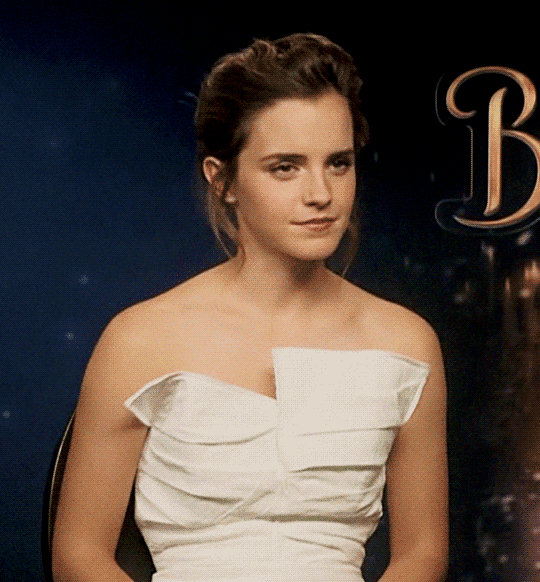
Three of mine are behind the cut.
As a note, none of these reflect upcoming Obsidian projects. Nor are they projects Obsidian would likely ever make. They don't fit the studio's brand. Which is why I'm dreaming about them here, and not pitching them internally.
So, first up!

A Squad-Based 1st-Person Firefighting Game with a Robust Relationship System and a Branching Narrative
I don't understand why there aren't more games about firefighting - though if I had to guess it's largely because making fire look good in-game is extraordinarily difficult. As is making an environment decay over time (though I suspect there are probably some pretty good, easy solutions for this using dev sleight-of-hand).
There are actually a Iot of interactive sim games about firefighting for training purposes. Much like war and flight, firefighting is something best trained without risking real life and limb.
Firefighting appeals to me as a gameplay space because it's actively protective - it's about limiting destruction and saving lives. But it can very easily be modeled with similar gameplay loops to shooters - ultimately both are about emptying rooms of danger - here it's just with water instead of bullets.
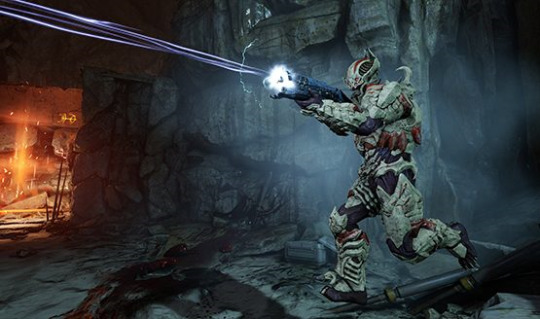
I could be water!
In short, firefighters engage in almost unequivocal good. They're heroic. They’re human. They’re flawed. And they brave dangers every day. But our industry basically ignores them.
Firefighting would give us the opportunity to set games in the modern world with people who, during their off hours, experience much more relatable struggles than your average freedom fighter, super spy, or elite soldier - relationship difficulties, debt, children, and the like.
So what would this game actually look and play like? It would likely be mission-based (calls come in of their own accord, after all), make use of movement and environmental hazards (not unlike a cover-based shooter), and have simple companion-direction mechanics similar to the Mass Effect trilogy or Spec Ops: The Line.
(Alternatively, the action could be dialed down a bit to focus on positioning a la Valkyria Chronicles.)
The gameplay would be focused on keeping your squad alive while saving as many people as possible.
Between missions you hang out at the station, or the bar, or at home - or try to balance all three, a la Catherine. You build relationships, helping your squad perform better together. You never recruit anyone, but your companions, your fellow firefighters, can die in missions, altering the narrative in both tone and content.

tl;dr: Mass Effect 2 meets Rescue Me with some dashes of Catherine
Next!

Narrative-Focused Urban Fantasy RPG/Immersive Sim
How does this not exist yet? Where's our Dresden Files or Hellblazer inspired RPGs? Or even The Magicians or Harry Potter, for that matter?
Where my Chilling Adventures of Sabrina RPG?
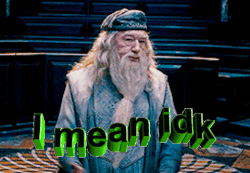
There's Vampire: The Masquerade: Bloodlines, which, while fantastic, is 13 years old.
While I'm looking forward to Necrobarista, that seems like a pretty tight, focused experience.
We've plenty of games with magicians in fantasy realms or in space - AKA BioWare's entire oeuvre - but few in the AAA space set in the modern world.
Unless you count superhero magicians.

Wait. Did Dr. Strange even get a game? Google suggests no. What’s going on here, videogame industry? Why won’t you suffer a witch to live?!
Honestly, I get to an extent why this is. There's a reason there've been Vampire: The Masquerade and Werewolf: The Apocalypse games, but no Mage games, either for Ascension or Awakening. Magic is broad, and often (especially in games) wildly destructive, which can be at odds with a modern setting (or rather what makes a modern setting interesting).
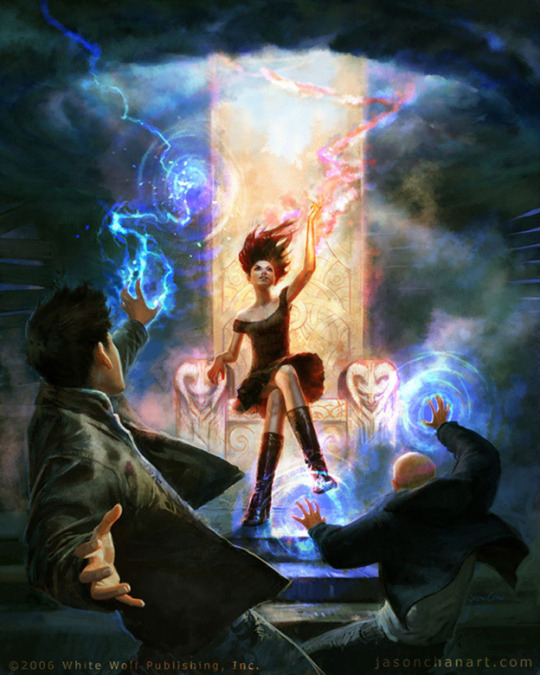
Art by Jason Chan, from Reign of the Exarchs by White Wolf.
But it doesn't have to be.
The flexibility of magic actually allows for a lot of different gameplay styles. You can do straight up first-person action like The Darkness or stealth survival like Last of Us. If I were to adapt Phonogram, a comic I love deeply, you can bet your ass there'd be beatmatch spellcasting.

A lot of gameplay mechanics we take for granted are actually damned-near magical.
Maps that point you where to go and tell you where your enemies are?
Dropping from a second story window without difficulty?
Regenerating health?
Items that make you smarter, stronger, or more likable?
Bullet time?
Rewinding to an earlier point in time to avoid death or a bad decision?
So that's another question a developer has to answer: if magic comes in so many shades, what color is yours? What are you hoping to accomplish?
For me, the presence of magic in the modern world demands a layer of secrecy that implies other layers of secrets. A modern world in which magic functions immediately deepens. What else lurks out there? Where are the other magicians? How are they using their abilities?
Additionally, magic is surreal. Bend and twist reality, and you're forced to look at it from new angles. If you can tweak people's emotional responses to you, how do you know the relationships around you are real?
And that's before you realize your dreams literally might come true - especially the nightmares. Is the face in the mirror a reflection, or something sinister and jealous? Is the ghost haunting you your literal past reaching out to reclaim you?

My dream modern magician game is an open-world immersive sim in an urban setting. Drop Prey, Dishonored, or BioShock style gameplay into a sprawling city filled with physics objects ripe for transmutation and NPCs waiting to be enchanted. Add an otherworld accessed by stepping through mirrors (the entire map within is reversed).
It's about what power can accomplish, what justifies its use, and what its limits are.
Populate the world with a few powerful magician NPCs with their own agendas; dozens of NPCs to chat up, learn more about, seduce, and manipulate; and a threat that could consume reality's very soul if someone doesn't step up to deal with it. Shake. Serve.

tl;dr: Dishonored meets Vampyr by way of Hellblazer and Hellboy
And finally!

Friendship Simulator 2019
My favorite parts of the Persona games and Catherine are the things outside of the core gameplay loops. The bits where you're hanging out with your friends, chatting with them, finding out more about them, and guiding and supporting them (or tearing them down).
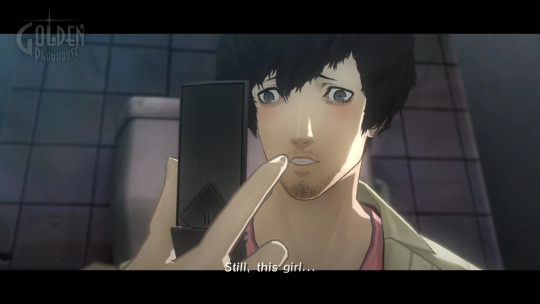
Or hiding in the toilet to text your significant other.
One of the things I love about Persona 5: Dancing Star Night in Starlight is that the narrative is almost solely in this mode. It's entirely about learning more about your fellow Phantom Thieves.
Lest you think I uncritically and unabashedly love it, P5D has some major narrative problems - it entirely fails to pay off its initial premise, for example, and there's no persistence to the player choices or (player-driven) reactivity within the narrative.
Nor does the way the player "progresses" the narrative make a tremendous amount of sense within the fiction of the world.
Sorry I got distracted.
Point is, from a narrative perspective it's a game about getting to know people better - literally exploring their lives - and then supporting (or undermining, if you're terrible) them.
Similarly, nothing the player says in Persona (or, for the most part, Catherine) has any impact on the game. The player might progress a Social Link more slowly by being an ass to the protagonists' friends, but they'll still increase that Link over time, provided they put time into it.
And I don't want to be dismissive here. Time management is one of the major ways in which the player engages with the Persona games. Outside of combat and maybe monster-training, it's probably the most important mechanic at play. Taking longer to max out a Social Link means you're missing other content and missing opportunities to increase your stats. Or maybe the Social Link doesn't get completed at all. (Sorry, Haru.) Or maybe you’re not powerful enough to overcome the next Shadow in time and your game ends. Those are non-trivial consequences.
But the story of the Social Link, or the story of the game, will never change based on (the vast majority of) the player's interactions with their buddies.
Despite that, the games give the player a lot of freedom as to when (or whether!) they approach those relationships.
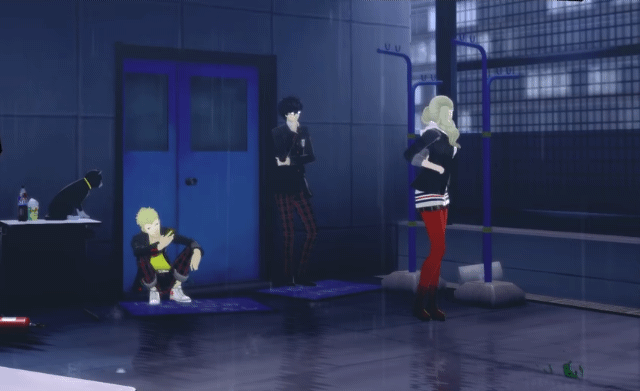
On the other end of the spectrum, Life is Strange (and Before the Storm) does a fantastic job of letting the player get to know the characters around Max (and Chloe) and responding logically to the player's choices.
The kid who has a crush on Max (Warren, I think?) remembers what the player promises him and then responds to whether or not the player follows through on it.
If Chloe plays A Game That Absolutely Involves Neither Dungeons Nor Dragons with her friends, they'll refer to it excitedly later and ask her to join in another round.
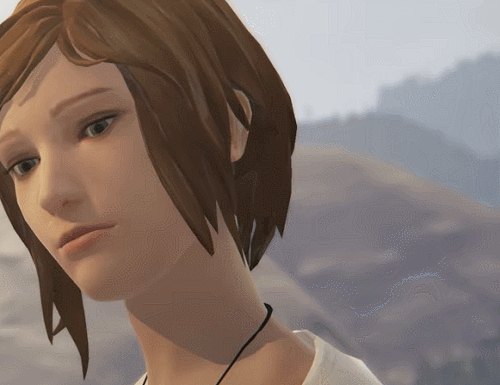
The TellTale games are also pretty good at this, especially Wolf Among Us, but that'll take me a bit far afield.
What Life is Strange does not provide the player is any control at all over the flow of the narrative. When the player completes a narrative beat within a scene, they're rushed along to the next scene, which is never one of their choosing. There's plenty of flexibility within the relationships (and within many of the smaller subplots), but little within the game's larger structure.
Ultimately, Persona provides little variability, while Life is Strange provides little narrative control.
I want to make a game that grabs the strong aspects of both of these while jettisoning their weaknesses.

(Far, far easier written than done!)
Basically, I want to make a game focused on the exploration of relationships. Where the personalities are the mysteries to unravel, and the interpersonal relationships between characters the dungeons to be navigated. Where the inner demons are the beasts in need of slaying - not through mystically entering the subconscious and doing battle with the Shadow, but through conversation.
I want a game about building a community, a family, and helping it come to support itself.
I think that one essential change that would make this significantly more doable is discarding the larger threats to the characters, especially those supernatural in nature. The relationships among the cast of Persona 4 are propping for the story of the Midnight Channel Murders. Arcadia Bay's pending apocalypse distracts from the relationships that seem to be the actual core story of Life is Strange.
(I find Before the Storm a stronger narrative than the original Life is Strange in large part because it's not being torn in multiple directions.)
Which isn't to say that there can't be threats, obstacles, and dangers. The world presents all manner of difficulties. Most of them requiring far more challenging and interesting solutions than "stick a sword in it."
That's a lot of abstraction, so what would this game actually look and play like?
Well, as I mentioned above, I think the Persona games, esp. Persona 4 Golden and Persona 5 already do a fantastic job of providing the player the framework for exploring a space and approaching relationships at their own pace.
Add into this characters that the player can engage with in order to learn more about them (not unlike Vampyr), help with their problems, and build (or break!) relationships with them or others, and you have something of an open-world interpersonal relationship game.
The narrative of these relationships would change based on the player's actions (both in regard to how they interact with the character and how they deal with (or fail to deal with) the character's problems). So would the player's reputation, which impacts their interactions with other characters.
(The reputation system is actually one of my favorite ideas in Pillars, but I think we sometimes fail to use it to its full potential. I certainly know I do.)
Side note: in this dream game, the relationships I'm describing are not expressed in a systemic way. They're not ranked like Social Links, and they don't have reputation bars like in Dragon Age or Tyranny. It's much more akin to Life is Strange here, with each character containing their own narrative(s) to be navigated.
Over time, you bring some of these characters closer to your protagonist, recruiting a tight-knit circle that helps you face the game's primary conflict. These relationships bounce off of one another. You can never make everyone happy, after all, and some people will never get along. Late game play requires that the player balance these relationships and help forge friendships or avoid catastrophic fallings out.
Yeah, but what is that primary conflict?
Potentially anything the world could throw at a person. A lot of television shows have provided us a framework we can borrow from. Veronica Mars comes immediately to mind. (Or one of my favorite films, Brick.) Then there's Lost, which is overtly about building communities and relationships in order to survive. The Wire is another possibility. (Imagine playing as a Stringer Bell type trying to build a crew while maintaining relationships with rival crews.)
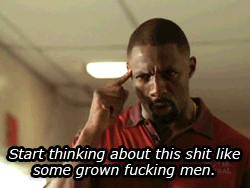
My point being that we already know what these kinds of stories look like. We just have to be brave enough to make a game that's focused around understanding other people rather than shooting them.
tl;dr: Life is Strange meets Persona, minus the strange and the personas
And that’s three glimpses into my brain. Into my dreams.
You may have noticed a few through lines. I'm pretty clearly interested in making games:
Set in the modern day
That tackle modern, realistic (and I use that term extremely loosely) concerns
That are largely non-violent
With non-linear narratives
That involve exploring the lives and feelings of non-player characters
And give those interpersonal relationships systemic narrative bite
Obviously, the projects I've been involved in recently don't check off every one of those boxes on my wishlist. That's generally how it is, if you're making games with other people.
But if you're very, very lucky, you get the opportunity to work on projects that scratch at least one or two of those itches.
I've been very, very lucky.
Cheers, <3 <3 <#
#gamedev#game design#narrative#relationships#persona#catherine#mass effect#life is strange#prey#dishonored#vampyr#necrobarista
9 notes
·
View notes
Text
Scarab #2
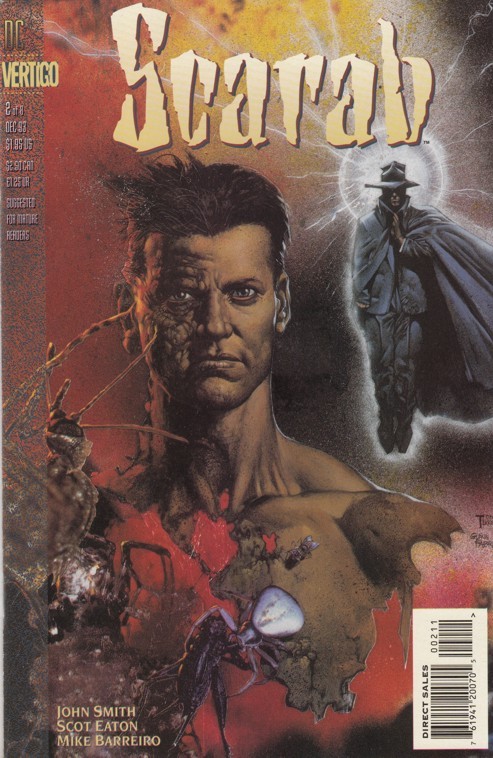
This looks like the original cover to a Philip K. Dick book where you just knew the editor and publisher had no idea what was happening so they commissioned some artist to just paint some "crazy fantasy shit."
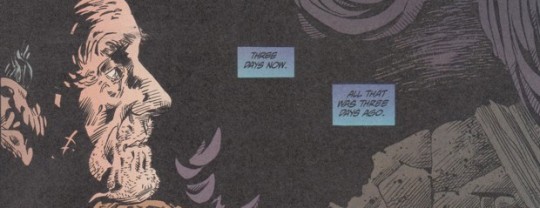
Boredom warning: the protagonist of this comic book is still a super old guy.
Eleanor isn't dead like everybody who read the first issue believed by the end of it. That means about ten people were surprised when they picked up Issue #2 of this series. Logically, I know more than ten people purchased Scarab #2. But if we lived in a world where comic book readers didn't just constantly shrug their shoulders and keep buying every issue of a series simply because they picked up the first issue and actually limited their purchases to comic books that had an entertaining previous issue, my estimate would probably be pretty close to the mark. Louis has brought Eleanor back into the Labyrinth of Doors to keep her alive because time doesn't work there. I mean, it does work there because people can move around there and movement is a symptom of time. Symptom might be the wrong word but when have I ever cared about my word choices? You either have time or you have stasis. You can't have both! Unless you live in the Phantom Zone and then I don't know what the fuck is going on. Sometimes kids grow up there and other times dogs roam billions of miles unchanged to find their stupid boy. If Louis wanted to be more accurate, he'd point out that life functions seem to slow down to imperceptibility inside the Labyrinth of Doors. If Eleanor seems like she didn't age for fifty years while living there previously, she probably won't bleed out until he can figure out how to work Scarab's super life saving powers on Eleanor, the way he used them after he was thrown out of a second floor window and became an undulating sack of blood and broken bones that somehow wormed his way up two flights of stairs and opened the bottom drawer of a dresser (which is the biggest impossibility. Go lie on your stomach on the floor right now and try to open your dresser drawer. If you were successful, now go belly flop off the roof of the house and try again, smart ass). Louis admits that Eleanor's soul has left her body so he's really just taking care of a naked empty vessel. The naked part is the most important part of Eleanor's current description. Why else would he want to prolong his grief when he knows she's dead? Now this pervert just gets his kicks off bathing her every twenty minutes.
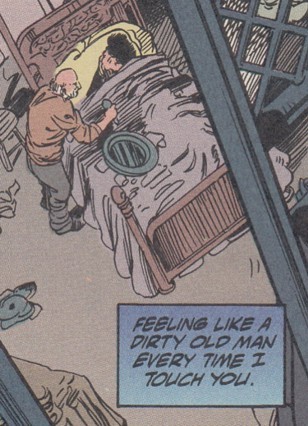
See? He admits it.
The Phantom Stranger arrives because why not. A writer has to throw something into this thing to attract buyers. Fans of The Phantom Stranger would have been all over this comic book when they saw him on the cover, probably doubling the amount of people who purchased it. Yes, I'm saying there are only ten Phantom Stranger fans. The Phantom Stranger really is a genius idea for a comic book character. If you call your character a stranger that means you can't divulge too much about that character lest they stop being a stranger. Which means you don't actually have to do any real work building the character, or giving the character motivation, or making any kind of sense at all! You can just have him poke his nose into other people's business every now and...um...help? Maybe not help? Maybe just judge. I don't really know what he does because he's been written so well over the years! I wish I could write a character this popular without ever giving it any defining characteristics or motivation. Oh, excuse me, I suppose The Phantom Stranger does have some defining characteristics. I forgot about the fedora and the trench coat. Meanwhile, a beam of light that used to be somebody (Eleanor? The Sicari?) flies through God's eye, circles Hell, and winds up coming its brains out in the Internet. I don't know how sexually exciting the Internet was in 1993. It was mostly just AOL chat rooms, bank account draining Neverwinter Nights, and Star Trek bulletin boards. Okay fine. I admit it. Just typing that gave me a boner. Once DC's Vertigo line was fully up and running with a few major titles leading the way and proclaiming, "This is what Vertigo is!", other titles with newer writers came along and all produced exactly the kind of shit that Vertigo apparently was. I don't know if I can fully articulate what that was, sort of a mash-up of Milligan's weirdness and sensitivity from Shade the Changing Man combined with the stark, metaphysical horrors of Moore's Swamp Thing and the shitty, grim reality and politics of Delano's Hellblazer with a sprinkling of the intellectual topsy-turvy re-tellings of mythic unreality of Gaiman's Sandman. But even unable to really describe it, I fucking know when I read something written to be a Vertigo title rather than written to be a story worthy of being a Vertigo title.
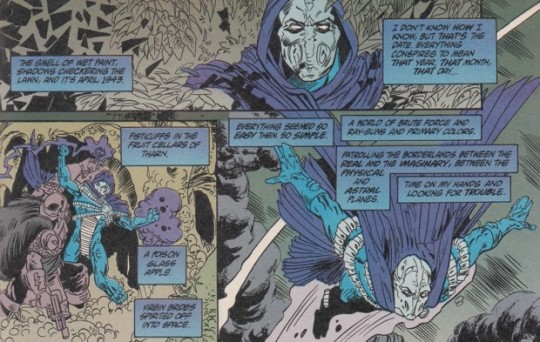
This might as well be a Polaroid of writer John Smith wanking himself off.
The early nineties were full of these kinds of Vertigo titles that just strung together words and phrases trying to invoke some kind of profound weirdness. Even the previous series I discussed, Milligan's The Extremist, came off as one of these books that was just putting on the clothing of Vertigo to make it seem more important. But at least The Extremist used the weird and outlandishly adult story to portray flawed humans considering their lives and how they got to where they were and what the fuck do they do now? There were some really bleak and gut-wrenching moments in The Extremist that I truly loved even if the plot didn't matter much to me. But it was the plot that pulled and pushed the characters to those moments, so who am I to complain? Also there were plenty of titties. I know, I know! All you high-falutin' comic book nerds don't read comic books to get boners like I do! Well la dee da! Just remember that I'm not judging you for getting your kicks by sticking your genitals in Blue Bonnet ice cream and putting it back in the display case. Um, anyway, this comic book still has a lot of space so I'm not giving up on it providing me with great moments. And since my tone in this commentary says I'm casually beating the shit out of Smith's writing," I should probably show something I sort of liked. The Phantom Stranger has touched Louis's head to make him relive some of his memories as Scarab. And while it's an easy way to present a bunch of "weird" story fragments that John Smith doesn't have to expound on, I still like this one:
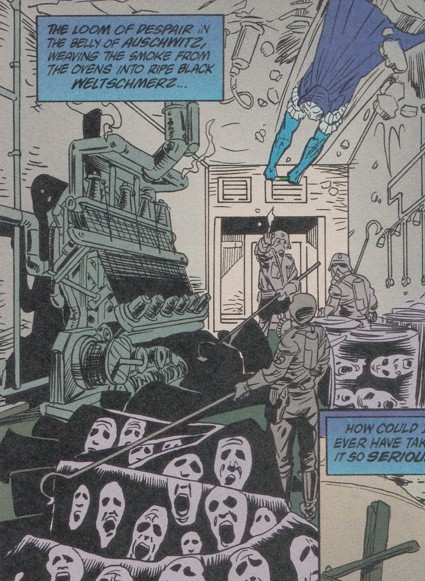
The Non-Certified Spouse tells me "Weltschmerz" means, literally translated, "world pain."
On the left hand, this is just more of that "here's some weird stuff to stick into this magazine to make it Vertigo!" But on the right hand, I'd love for this to actually be a story that Smith thought out and formed into a coherent, deep, and touching two to four issue arc. Maybe Smith jotted it down and thought, "That's really all that needs to be said about that." But isn't that also how pitches start? This is a pitch. The story that could grow from this could be tragic and heartbreaking with all the nihilistic elements to ultimately provide evidence of the uplifting and hopeful nature of mankind. I think maybe this one panel should have been the pitch for Scarab. Some more of Louis's memories ("Frozen in ice on the dark side of the moon, summoning the Breathing Trees for help" and "Teaming up with Sargon the Sorcerer against the dreaded double menace of Doktor Vortex and The Quote") help establish that the Scarab had weird adventures that, while extruding the essence of Vertigo phrases, also helps ground the Scarab in the Golden Age. Because that's weird shit that you can absolutely see on the cover of comics with huge price tags hanging on the wall behind the counter of any local comic book shop. No difference exists between the two scenarios I just quoted and Batman and Robin battling "The man who saw with his fingers!" Smith is definitely evoking the Golden Age here. And, of course, Vertigo because that Auschwitz thing.
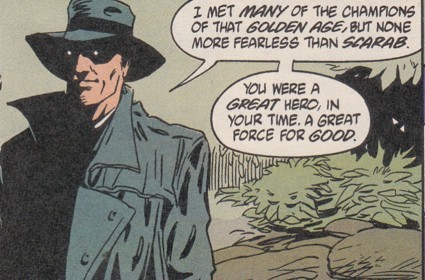
Look at me! Reading into and explicating the evidence of the text when I could have just kept reading ahead and had John Smith say it to me plainly.
The Phantom Stranger tells Louis he needs to become the Scarab again because "the world skin is diseased" and "the wheels of chance are turning too fast" and "disorder corrupts the physical plane." But then when Louis is all, "So that's why all this shit is happening!", The Phantom Stranger says, "Well, I mean, it's hard to tell for sure. But, you know, maybe somebody sent the Sicari. It's a possibility. But then, maybe not. Who knows? But just do what I say, just in case! I'm sure if Madame Xanadu were here, she'd totally agree with me." Meanwhile, the light that actually is Eleanor isn't in the Internet at all. When it said it had entered "the Net" while orgasming harder than it's ever orgasmed before (take that, Louis!), I simply assumed Smith was being all cutting edge in 1993. But he just meant the "net of life" or whatever. She's just connected to everything now. That's probably a better path for this story since the Internet wouldn't get interesting for another year when Geocities came along and The X-Files fan pages started to proliferate like cancer cells. Louis's only desire is to find Eleanor again so if becoming Scarab can help do that, he'll take it back and maybe he'll get around to saving the world too. The Phantom Stranger just remains silent because that's what he does best. As if he knows anything! He's totally acting like he knows stuff by not saying stuff but really looking like he knows that stuff while he really don't know any of that stuff. Like knows like, my man, and I see you! The Phantom Stranger leaves and Louis asks the scarabaeus (that's the thing that turns him into the Scarab which I also probably spelled incorrectly) to make him young again and it works! Issue #3 is going to be more exciting simply because the protagonist isn't an old man anymore! Me and six other people can't wait for it! Scarab #3 Rating: B. Enh, it wasn't so bad! Sure, I had plenty to criticize. But in the end, it's a story about mortality and longing for the expansive freedom and possibility that fall further and further into a person's past until all they have left is the end of fatigue promised by death! I can totally relate to this shit.
0 notes
Text
The Hellblazer #7
Paris Uber is the worst.
You're in DC Comics' Paris. The Eiffel Tower is in every single establishing shot of the city. How else would I have known Constantine was taking Paris Uber just by looking at the cover?! The filthy pigeons could have made it any city!
This issue is part one of "The Smokeless Fire." But they weren't done with the last story, were they?! I guess Mercury trapping a genie in her head while the other genie gathered the Magicians of London together to save the world and/or battle Constantine was an ending? At least for awhile? This is probably just one of those stories that needs to be told before finishing the other story because something integral to the plot in this one will be used to save the day in the other one. The story is the story of the man Constantine and Mercury have Chunneled to Paris for help against the Djinn. The story is about an expedition he took in 1936 to a place where Djinn were said to live. Constantine first heard the story from the old man in a bar. Now he's come to Paris because he's starting to think the old man's story was true and not just an attempt to get into John's pants.
Nice synopsis panel for those of us with bad memories. I also included the next panel because John uses the word "arsehole" and Mercury references Through the Looking Glass.
Constantine and Mercury aren't the only ones trying to find Old Man Genie Killer, Esquire. A bunch of young Parisian punks have decided they're going to rob his ass. They almost run over Mercury while fast and furiousing their way to steal the old man's antiques. Mercury manages to read their minds and realizes they're after the same bloke. I guess Constantine and Mercury having a conversation while they walk to the old guy's home wasn't exciting enough for a comic book. This is the action part to keep everybody's penises in their hands. Yes, that's a sexist statement. Just wait to hear what I have to say when there's a kiss! The old man confesses the location of his secret diary to Dante, the newest and most human of the gang². When John and Mercury arrive, Dante flees with the book as the old man lies dying of a heart attack. Mercury stays behind to save the old man's life with her, um, mind powers? I guess? Constantine takes Paris Uber out the window and onto the rooftops. But he misses his connection, falls into a bush, and is arrested by Paris cops. Dante flees back home and begins reading the diary of the old man. Well, at least Dante will know how to kill a Djinn! That could come in useful in some other story that's about Dante and not Constantine. Constantine, on the other hand, is fucked. The Ranking! No change! I'm disappointed that Moritat didn't do the art again. But everything else was satisfying. Except maybe that part where Constantine held a mundane conviction too strongly. __________________________ ¹That I'll be mentioning in this comic book review. ²Dante had a scene earlier teaching his little sister math and promising to never leave her. The other gang members were inhuman monsters. You could tell because they didn't get any scenes in which they weren't just stereotypes.
3 notes
·
View notes